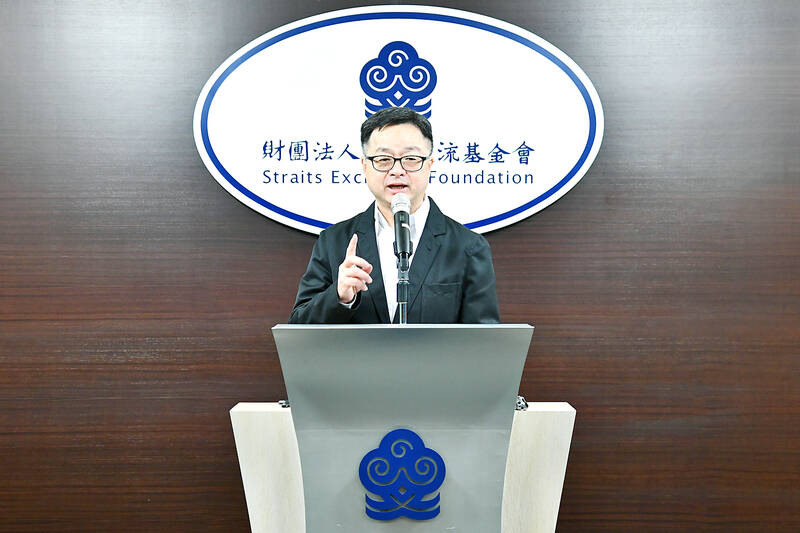There are 77 incidents of Taiwanese travelers going missing in China between January last year and last month, the Straits Exchange Foundation (SEF) said.
More than 40 remain unreachable, SEF Secretary-General Luo Wen-jia (羅文嘉) said on Friday.
Most of the reachable people in the more than 30 other incidents were allegedly involved in fraud, while some had disappeared for personal reasons, Luo said.

Photo courtesy of the Straits Exchange Foundation
One of these people is Kuo Yu-hsuan (郭宇軒), a 22-year-old Taiwanese man from Kaohsiung who went missing while visiting China in August. China’s Taiwan Affairs Office last month said in a news statement that he was under investigation for his alleged involvement in a fraud case.
On the risks for young people traveling to China job opportunities, Lu said: “Youth unemployment [in China] has risen so high that no more high-paying jobs would be left for Taiwanese — people should have common sense,” Luo said.
Taiwanese should be wary if someone such as a friend, acquaintance or stranger touts job opportunities in China that are “highly profitable,” Luo said, adding that those who are tricked into visiting China would likely be forced to do something illegal.
Once they are arrested and prosecuted for crimes such as fraud, they could be put in jail without receiving a fair trial, as China is not a country with the rule of law, he said.
Separately, Democratic Progressive Party Legislator Lin I-chin (林宜瑾) on Friday questioned the Mainland Affairs Council (MAC) on its countermeasures against China’s new policy to “attract first-time visitors from Taiwan.”
Although the MAC issued an “orange” travel warning against China on June 27, the Chinese government has launched a campaign offering first-time holders of “Taiwan Compatriot Permit” free access to more than 1,000 tourist spots in China, she said, asking how the MAC would address the situation.
MAC Minister Chiu Chui-cheng (邱垂正) said Taiwanese should be aware of the risks to their safety when traveling to China, and avoid visiting China, Hong Kong and Macau if it is not necessary.
The travel alert for China, Hong Kong and Macau was upgraded to “orange” in response to Beijing’s announcement of 22 guidelines in June to punish “Taiwanese independence separatists,” which pose a real risk to the personal freedom and safety of Taiwanese, he said.
The 22 guidelines feature vague legal definitions and “uncivilized” rules including long-arm jurisdiction, a lifelong retroactive period, trial in absentia, death penalty and confiscation of property, Chiu added.
Additional reporting by CNA

A preclearance service to facilitate entry for people traveling to select airports in Japan would be available from Thursday next week to Feb. 25 at Taiwan Taoyuan International Airport, Taoyuan International Airport Corp (TIAC) said on Tuesday. The service was first made available to Taiwanese travelers throughout the winter vacation of 2024 and during the Lunar New Year holiday. In addition to flights to the Japanese cities of Hakodate, Asahikawa, Akita, Sendai, Niigata, Okayama, Takamatsu, Kumamoto and Kagoshima, the service would be available to travelers to Kobe and Oita. The service can be accessed by passengers of 15 flight routes operated by

GIVE AND TAKE: Blood demand continues to rise each year, while fewer young donors are available due to the nation’s falling birthrate, a doctor said Blood donors can redeem points earned from donations to obtain limited edition Formosan black bear travel mugs, the Kaohsiung Blood Center said yesterday, as it announced a goal of stocking 20,000 units of blood prior to the Lunar New Year. The last month of the lunar year is National Blood Donation Month, when local centers seek to stockpile blood for use during the Lunar New Year holiday. The blood demand in southern Taiwan — including Tainan and Kaohsiung, as well as Chiayi, Pingtung, Penghu and Taitung counties — is about 2,000 units per day, the center said. The donation campaign aims to boost

ENHANCING EFFICIENCY: The apron can accommodate 16 airplanes overnight at Taoyuan airport while work on the third runway continues, the transport minister said A new temporary overnight parking apron at Taiwan Taoyuan International Airport is to start operating on Friday next week to boost operational efficiency while the third runway is being constructed, the Ministry of Transportation and Communications said yesterday. The apron — one of the crucial projects in the construction of the third runway — can accommodate 16 aircraft overnight at the nation’s largest international airport, Minister of Transportation and Communications Chen Shih-kai (陳世凱) told reporters while inspecting the new facility yesterday morning. Aside from providing the airport operator with greater flexibility in aircraft parking during the third runway construction,

American climber Alex Honnold is to attempt a free climb of Taipei 101 today at 9am, with traffic closures around the skyscraper. To accommodate the climb attempt and filming, the Taipei Department of Transportation said traffic controls would be enforced around the Taipei 101 area. If weather conditions delay the climb, the restrictions would be pushed back to tomorrow. Traffic controls would be in place today from 7am to 11am around the Taipei 101 area, the department said. Songzhi Road would be fully closed in both directions between Songlian Road and Xinyi Road Sec 5, it said, adding that bidirectional traffic controls would